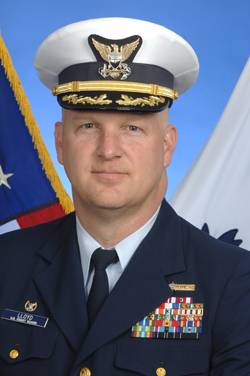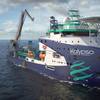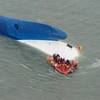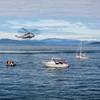INSIGHTS
Captain Anthony Lloyd, Commanding Officer, U.S. Coast Guard National Maritime Center.
Captain Anthony Lloyd is the Commanding Officer of the National Maritime Center (NMC). He assumed that position in September of 2010 after serving three years as the Coast Guard’s Program Manager for marine environmental response. The nationally-focused Officer in Charge of Marine Inspection (OCMI) tasked with implementing the Coast Guard’s Mariner Credentialing Program, the NMC, and the 20 field units under Lloyd’s direct control, are comprised of around 370 military, civilian and contract personnel serving throughout the U.S. and its’ territories. Located in Martinsburg, WV, NMC is responsible for credentialing the 210,000 U.S. mariners to ensure the safety, security and stewardship of the Maritime Transportation System (MTS). As the point man for the Coast Guard’s ongoing effort to streamline its mariner credentialing programs, Lloyd weighed in this month with MarineNews and answered some tough questions on the future of the National Maritime Center and its important missions.
In the years following the consolidation of credentialing duties of the last Regional Examination Center (REC), the National Maritime Center had an arguably rocky start in the eyes of some commercial mariners, but has since found its sea legs. Give our readers some perspective of where NMC is today:
The successful centralization of mariner credentialing at the NMC, while in many ways largely complete, continues to play out as the “effects of centralization” impact the MTS. For example, our focus on customer service is central to developing and maintaining good relationships with individual mariners. With centralization credential processing has become faster with higher consistency but there is a need to ensure mariners understand exactly what the suite of support tools can do for individual mariners. We have field units where mariners can test, seek assistance with their application, and find out additional information. Our call center is open with extended hours for west coast mariners and the customer service center staff can answer most mariner questions, over 90%, without having to transfer the call. Additionally, we have two additional customer service center staff available to handle medical issues. Mariners need only call and ask for the medical help desk to access this service. Our website is also an excellent source of information. We are constantly ensuring the accuracy of our website info and invite mariners to spend some time looking at the NMC’s website. We have a customer satisfaction survey and absolutely need all of our customers to fill that out to rate us on our performance. Currently, on a scale of 1 to 5 we are averaging around 4.3 but certainly are not satisfied that every thing that needs to be improved is complete. There is always room for improvement.
NAVC 04-08 – the Coast Guard’s new medical examination protocol – is a sometimes contentious policy that is affecting mariners. What percentage of mariners are actually being found to be not physically competent to be credentialed at this time? In comparison to the old system?
Our estimate of denials based upon medical issues is just below two percent of the approximately 60,000 applications we see per year. It’s a rough estimate but one that we explain on the NMC’s website. We have only been able to track denials in this fashion since centralization (records prior to that either aren’t fully accurate or available). On the web site you will find the top conditions that we are seeing as causal for denial with Cardiac conditions arising from Coronary Artery disease as the most frequent reason. Behind that condition are Uncontrolled Diabetes Mellitus and Chronic use of Narcotics, Benzodiazepines, Sedative-hypnotics Medications. Additionally, the NMC medical staff has found that Uncontrolled Sleep Disorders, Unstable Mental Health Conditions, and Seizures are the next most likely conditions that result in denial. This issue is resonating at the highest levels of the industry, the Coast Guard, and in government which is why the Coast Guard is relying on the Merchant Mariner Medical Advisory Committee (MMMAC) to assist with revising the current medical guidance; Navigation and Inspection Circular – (NVIC 04-08). Coast Guard headquarters announced in the Federal Register Notice of the 2nd MMMAC Meeting at http://www.gpo.gov/fdsys/pkg/FR-2012-04-06/pdf/2012-8288.pdf. The meeting was held on May 8 - 9 at the NMC. Your readers may want to see a more detailed description of the agenda, notes, etc. These materials can be found on the Coast Guard's homeport website along with the task statements and other related MMMAC material: https://homeport.uscg.mil/mycg/portal/ep/channelView.do?channelId=-48224&channelPage=%2Fep%2Fchannel%2Fdefault.jsp&pageTypeId=13489
Regarding the new medical policy – has your staff been augmented to the point where they are keeping up with the pace of applications and issues?
The Medical Staffing and processing improvements that were implemented a year ago continue to work well. As you recall, several changes within the Mariner Medical Evaluations Division were made to improve customer service. The turnover of government medical evaluations personnel, coupled with a transition to a new medical services contractor, prompted the need for strong intervention by the NMC staff. That occurred and has been successful. We feel we have worked through most of the inventory and cycle time issues and continue to more fully able to address mariner concerns, specifically related to the medical portion of the application review. We took additional steps to assign full-time, on-call medical experts to receive calls from mariners and their physicians. These positions handle calls relating to mariners who have submitted a medical fitness application. Additionally, we are currently fully staffed with 35 permanent government, and contract, medical screeners, evaluators, and reviewers. The work for medical personnel in the Mariner Credentialing Program is primarily in the field of Occupational Health Medicine, and their focus is on consistency and fairness while keeping maritime safety in mind. Subsequent to the work last year on filling and stabilizing staff, we have focused on revisions and improvements to our internal guidance documents. Additionally, we’ve made adjustments to the review and processing of medical applications in conjunction with our numerous audits to improve the consistency of reviews.
Mariners are hearing a lot about a proposed rulemaking that eventually involves a medical “certificate of fitness.” How will NMC be structured to handle this increase in paperwork – and the fact that this may come at a more frequent timeframe – two years versus the current five.
Centralization is definitely the best way to handle any increases, or changes, which may occur. To recap, on November 3, 2011, the Coast Guard publicly announced the availability of recommendations from MERPAC and the MMMAC concerning the SNPRM derived from the NPRM published to incorporate all effective amendments to the International Convention on Standards of Training, Certification and Watchkeeping for Seafarers, 1978 (STCW Convention) and Seafarer’s Training, Certification and Watchkeeping Code (STCW Code) in the federal register. (76 FR 68202). The 30-day public comment period closed on December 5, 2011. On January 4, 2012, the Coast Guard published a notice of policy informing the public that the 2010 amendments to the STCW Convention entered into force for all ratifying nations on January 1, 2012 (77 FR 232). The notice also encouraged vessels operating in foreign ports to implement provisions of the 2010 amendments concerning hours of rest and security training to minimize potential port state control detentions. That is the current status regarding the proposed rulemaking that can be stated at this time. The NMC has extensively planned and coordinated with the regulations staff at Coast Guard Headquarters and this question perfectly illustrates the wisdom behind the centralization and restricting of the program. We are more consistent now because of centralization, which aids with the proper implementation of all our guidance, to include medical reviews. We’ve made plans, implemented appropriate revisions and training, and are conducting ongoing coordination to prepare for when full implementation arrives.
What advice would you give mariners who are getting ready to submit documents for renewal, original documents or upgrade?
The primary piece of advice I'd give to any mariner who is putting together a mariner credential application is that you are not alone. The CG NMC has multiple resources for all mariner applicants to aid them in ensuring an application package is complete as I pointed out earlier. Visiting one of our 17 Field Offices, logging onto our comprehensive website, or contacting our Customer Service Branch (1-888-IASKNMC, [email protected]) are all ways that mariner applicants can have their application preparation questions answered. All of these services come at no cost to individual mariners or stakeholders. It’s a good deal and can help mariners gain better understanding of what is required without having to pay any fees prior to submission of the application.
Regarding current challenges on applications for the month of March 2012, the primary incomplete applications reasons were: (1) Additional physician information needed; (2) Additional sea service information needed; (3) CG719K Physical Exam Report missing or incomplete; (4) CG719B Application form incomplete; and, (5) DOT Chemical Testing results missing or incomplete. The particulars of each of these scenarios could, in most cases, have been resolved beforehand by utilizing the information tools available listed above, thus resulting in less delays for the applicant and quicker receipt of their merchant mariner credential. That is important for all to know and an area we will be focusing on for the next year or so.
The marine safety / credentialing track has, in the past, not necessarily been one that’s conducive to advancement within the Coast Guard. Today, are you getting renewed interest from within the Coast Guard to get new blood into the program or is NMC moving more towards a civilian-civil service approach, using people with industry experience. In other words, how are you growing and training to achieve expertise – is it an organic process or are you hiring from outside the service?
This has absolutely been a concern of mine as well and interest is up. Fortunately, we’ll be able to improve our expertise by both hiring outside talent and integrating the credentialing track into the larger Prevention program to bring in talent from throughout the Coast Guard. In fact, currently a large number of credentialed mariners are assigned and working at the NMC. Our training and assessment division, for example, has a combined 150+ years of maritime experience focused on course oversight and approval. That’s impressive. For our military members at the NMC, we’ve started meeting as a group on a regular basis to discuss topics critical for career management and professional growth. Additionally, we’ve stepped up our interaction with career management and assignment personnel as well as program managers at Coast Guard Headquarters and the training center in Yorktown, VA. All of the officers that have come into the NMC recently have been excellent candidates with great experience, plus they wanted to come to the NMC precisely because it is a great place to work. Right now we are helping to revise curriculum used to train inspectors and investigators at the Yorktown training center so that all credentialing information is up-to-date. Further, we are revising processing guidance, and talking to Coast Guard commands about it, to improve awareness of what we do while also seeking further gains in processing times. This is especially true for Local Limited, First Class Pilot, and restricted tankermen credentials which require the coordination of local Officer in Charge of Marine Inspection (OCMI) approvals to ensure leadership at Coast Guard Sectors are aware of, and have approved, important aspects of these credentials. It’s important professionally for our Prevention Career Specialists to have the latest information on credentialing and to understand that things are more different now than at any time in the past 10 years.
A primary goal of your predecessor, Captain Stalfort, had been to rid the credentialing process of as much paper as was possible. How is this effort to provide an “e-documentation” process going?
We remain focused on that goal. Your readers may recall Captain’s Stalfort’s article in the June 2008 issue of the Proceedings of the Marine Safety Council. That story relates the experience of a fictional Captain Scott who interacts with the credentialing process while underway in the Malacca straits. Five years later that story remains an apt description of where we are headed. We have an ongoing project with the Coast Guard’s Operation System Center to implement this improvement. Today’s system remains a hybrid system but our focus is on this future experience. Currently, mariners are submitting applications that must be processed into our system. Pushing that user input interface directly to the mariner is the largest technical challenge and the heart of the envisioned future. Current performance is actually working quite well and we continue to see improvements through strong leadership and talent, good old fashion hard work, and innovative thinking throughout the NMC. For February and March: we held our net processing time (defined as the time that the NMC staff is working on a credential) to below 12 days for two solid months. For those two months, we produced approximately 14,000 credentials while keeping our inventory below 2,500 credentials in process. Most mariners are receiving their credential in less than 30 days and the significant majority receives it in less than 2 weeks. Our desire for the future, in an effort to build upon this significant progress, is to go from our current time frame of reference of Months, Weeks, Days to Days, Hours, Minutes in processing time.
(Taken from MarineNews magazine's May print edition)

















